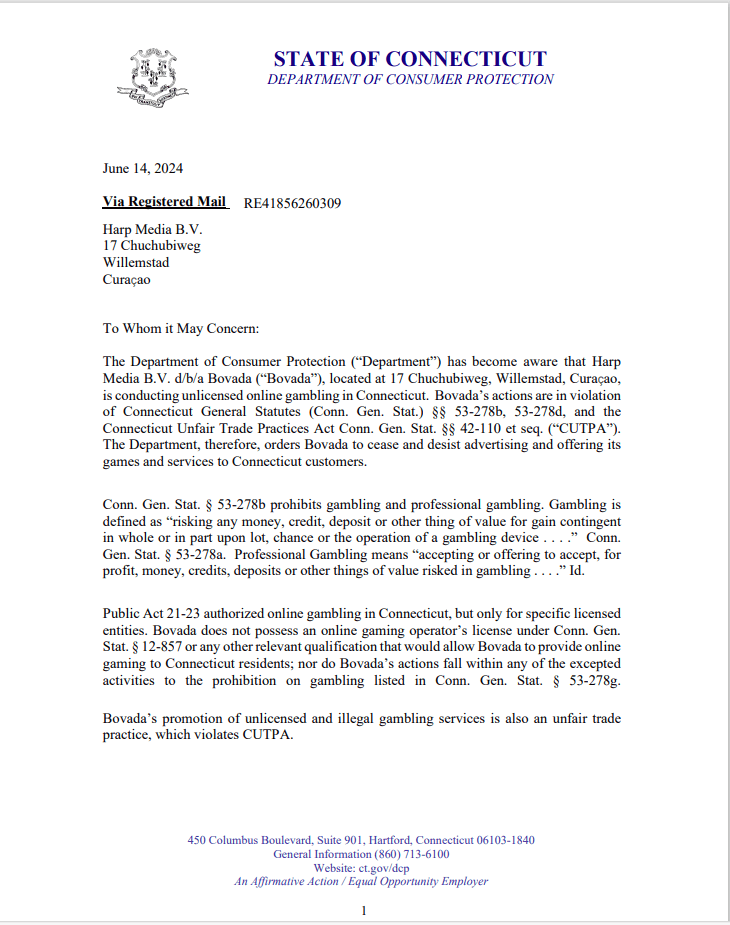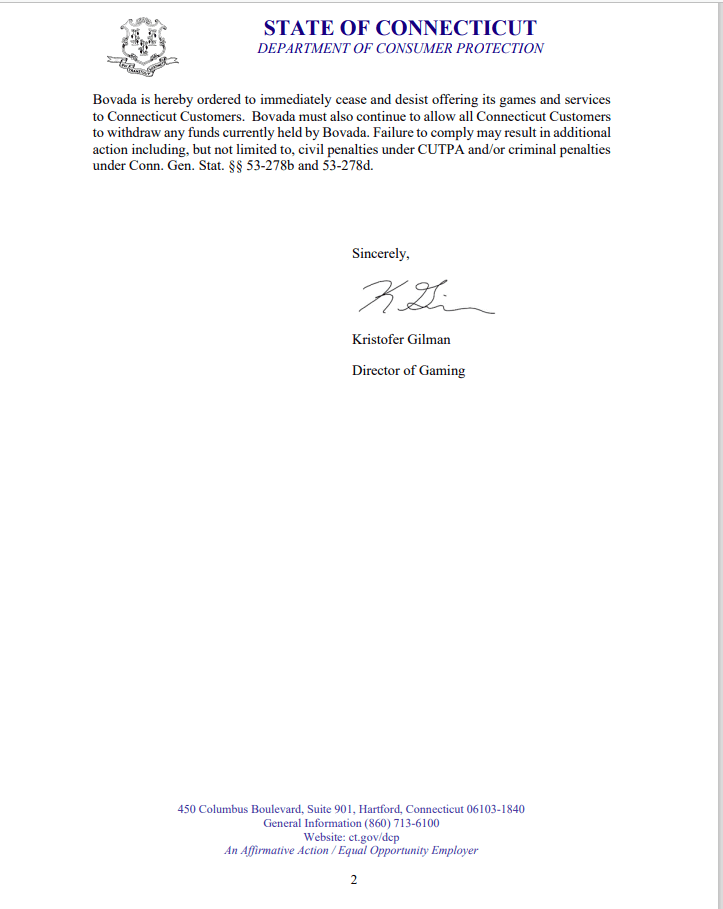
Mar 30, 2024; Boston, MA, USA; Connecticut Huskies guard Cam Spencer (12) reacts against the Illinois Fighting Illini in the finals of the East Regional of the 2024 NCAA Tournament at TD Garden. Mandatory Credit: Winslow Townson-USA TODAY Sports
- The Connecticut Department of Consumer Protections has officially sent a cease-and-desist letter to Bovada
- The department is requiring Bovada immediately cease all services in the state
- If the offshore, unregulated sportsbook and casino does not halt its services, it will be subject to civil or criminal penalties
The Connecticut Department of Consumer Protections has officially sent a cease-and-desist letter to Bovada, an offshore, unregulated sportsbook and casino, requiring that it halt its services in the state immediately.
The Department of Consumer Protections alerted Sports Betting Dime today that it sent the notice to Bovada on Friday, June 14.
The letter requires the illegal sportsbook operator to “immediately cease and desist offering its games and services to Connecticut customers” or it may result in civil and/or criminal penalties.
Latest State to Officially Require Bovada’s Exit
A spokesperson for the Connecticut Department of Consumer Protections told Sports Betting Dime on June 11 that it would be sending Bovada a cease-and-desist letter. The notice went out to the operator three days later.
In a letter written by Kristofer Gilman, Director of Gaming in Connecticut, Harp Media B.V., which is located in Willemstad, Curaçao, is notified that it is in violation of Connecticut General Statutes 53-278b, 53-278d, and the Connecticut Unfair Trade Practices Act (CUTPA).


Bovada does not possess an online gaming operator’s license in the state, nor do its actions fall within any of the excepted activities to the prohibition on gambling, Gilman wrote in the notice.
“Bovada’s promotion of unlicensed and illegal gambling services is also an unfair trade practice, which violates CUTPA,” Gilman wrote.
In addition to ceasing its services in the state, Bovada is required to allow Connecticut customers to withdraw any funds. If it fails to do so, Gilman warns that it may result in additional action including, but not limited to, civil and/or criminal penalties.
The offshore, unlicensed sportsbook and online casino Bovada is widely available throughout the country, but has banned customers from Delaware, New Jersey, New York, Maryland and Nevada in recent years after the states passed legislation to curb their operation.
States Examining Bovada’s Operations
Connecticut’s letter comes on the heels of a cease-and-desist letter sent to the operator by the Michigan Gaming Control Board on May 29.
The gaming control board gave Harp Media B.V. 14-days from the receipt of the letter to prevent Michigan residents from gambling on their websites, or the MGCB will take legal action against the company.
The company has yet to respond to the notice.
The gaming control board claims Harp Media B.V. is in violation of several Michigan gaming laws:
- Lawful Internet Gaming Act: States internet gaming may only be offered by a licensed internet gaming operator
- Michigan Gaming Control and Revenue Act: Prohibits a party from conducting a gambling operations without a licensed issued by the MGCB. Parties operating unlicensed gambling operations in the state may face imprisonment for up to 10 years or a fine up to $100,000 or both
- Michigan Penal Code: Broadly prohibits any form of gambling, which generally involves the elements of consideration, prize, and chance. Such as, accepting money, or anything of value, with the understanding that money, or anything of value, will be paid to any person based on the outcome of an uncertain event is prohibited
The Massachusetts Gaming Commission recently revealed that they will be examining Bovada as well. The regulatory body last week discussed potentially sending a cease-and-desist letter to the illegal offshore online sportsbook and casino at a future meeting.
“I wonder if it’s worthwhile to have a discussion among the commissioners as to whether there are any steps we may want to take,” Massachusetts Gaming Commissioner Nakisha Skinner said.
The MGC agreed to evaluate the potential solution at a future meeting.
Rob covers all regulatory developments in online gambling. He specializes in US sports betting news along with casino regulation news as one of the most trusted sources in the country.
Connecticut Issues Cease-and-Desist Letter to Bovada for Unauthorized Operations
The state of Connecticut has recently taken action against online gambling site Bovada, issuing a cease-and-desist letter for operating without proper authorization. The letter, sent by the Connecticut Department of Consumer Protection, highlights the state’s concerns about Bovada’s activities and warns the company to stop offering its services to residents of Connecticut.
Bovada, which is based in Costa Rica, has been operating in the United States for several years despite not having the necessary licenses to do so. The company offers a range of online gambling services, including sports betting, casino games, and poker, to players across the country. However, Connecticut officials have made it clear that Bovada’s activities are illegal in the state and must be stopped immediately.
The cease-and-desist letter is just the latest in a series of actions taken by states to crack down on unauthorized online gambling operators. In recent years, several states have passed laws to regulate online gambling and ensure that only licensed operators are allowed to offer their services to residents. Connecticut’s move against Bovada is part of this broader trend towards stricter enforcement of gambling laws.
In response to the cease-and-desist letter, Bovada has stated that it is reviewing the situation and will take appropriate action. The company has also emphasized its commitment to compliance with all relevant laws and regulations. However, it remains to be seen whether Bovada will comply with Connecticut’s demands or face further legal action.
Overall, Connecticut’s decision to issue a cease-and-desist letter to Bovada sends a strong message to other online gambling operators that unauthorized activities will not be tolerated. By taking a firm stance against illegal gambling, the state is working to protect consumers and uphold the integrity of its gambling laws. It remains to be seen how Bovada will respond to the letter and whether it will ultimately comply with Connecticut’s demands.
